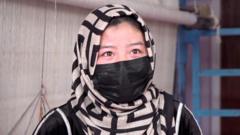Senamile Masango, South Africa's first black female nuclear scientist, has died at 37. Celebrated for her contributions to science and advocacy for women, her legacy endures as she inspired future generations despite facing systemic discrimination.
South Africa Remembers Senamile Masango: A Champion for Women in Science

South Africa Remembers Senamile Masango: A Champion for Women in Science
The nation mourns the loss of its pioneering black female nuclear scientist who inspired countless young women.
South Africa is grieving the loss of one of its most influential figures in science, Senamile Masango, who passed away at the age of 37. The government confirmed her death on Sunday, though the cause remains undisclosed. Masango, often referred to as "the queen of science," had devoted her life to inspiring young women to pursue careers in STEM fields.
Deputy President Paul Mashatile remarked on her role as a "beacon of hope" for many, particularly young women, and highlighted the discrimination she often faced as a black woman in her field. Despite her many accomplishments and her position as a respected scientist, she constantly battled biases that called her expertise into question.
Masango made history as the first African woman to collaborate with an African-led team at CERN, the world's preeminent particle physics laboratory, where groundbreaking experiments take place. Her commitment to furthering science education and empowerment among women and underprivileged communities had a significant impact, as noted by South Africa's Department of Science, Technology, and Innovation.
Hailing from the rural village of Nongoma in KwaZulu-Natal—home to the Zulu monarchy—Masango was born into a challenging family structure and was raised with an awareness of her royal heritage. Her passion for science ignited at a young age, fueled by a geography teacher’s discussion of astronauts. Masango's academic journey began at the University of Zululand, where she initially faced setbacks due to pregnancy and family responsibilities.
However, she returned to her studies and received both her undergraduate degree and an MSc in nuclear physics, graduating with distinction. Sadly, she experienced personal tragedy when her daughter passed away in a car accident at the tender age of seven.
Beyond her scientific achievements, Senamile Masango founded an initiative to encourage girls to embrace science, recognizing early discouragements as a barrier to female participation in nuclear and scientific fields. Her accolades included being named among South Africa's most successful black women scientists under 35 in 2019 and receiving the International Women in Science Award in 2022.
Masango, however, was candid about the challenges of misogynoir throughout her career, recognizing that black female scientists often have to prove their worth repeatedly. "There are still very few black women scientists," she stated, emphasizing the need for greater representation and resilience in the face of adversity.
Her legacy will undoubtedly inspire and empower future generations of scientists and innovators to break barriers and pursue their passions boldly.



















